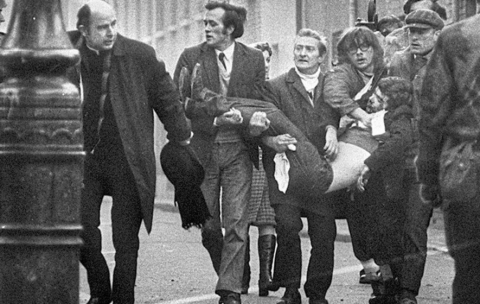50th Anniversary of Bloody Sunday

Bloody Sunday happened on 30th January 1972 in the Bogside area of Derry, in the north of Ireland. British soldiers belonging to the 1st Battalion, Parachute Regiment (1 PARA) shot 26 unarmed civilians during a civil rights protest march. Fourteen people were killed, thirteen outright, while another man died of his injuries four months later. Some of the victims were shot when attempting to flee from the soldiers, others were shot while trying to help the wounded. Some protesters were injured by rifle butts and rubber bullets, while two were run down by army vehicles.
All of the soldiers responsible claimed that they had shot at gunmen or bomb-throwers. Father Daly and other marchers made it clear when interviewed at the time that this was not the case and the victims were unarmed civilians with many being shot in the back by the British Army. Two investigations have been held by the British government into the massacre. The first and now discredited Widgery Tribunal, held in the immediate aftermath of the incident, for the most part cleared the British forces of blame. Seen as a "whitewash" a further enquiry was demanded and The Saville Inquiry was established in 1998 to reinvestigate the incident.
After a 12-year inquiry, Saville's report was made public in 2010 and concluded that the killings were both "unjustified" and "unjustifiable". Concluding that those shot were unarmed, that no bombs were thrown, and that British soldiers "knowingly put forward false accounts" to justify their firing. On the publication of the report, then British prime minister David Cameron made a formal apology on behalf of the United Kingdom.





